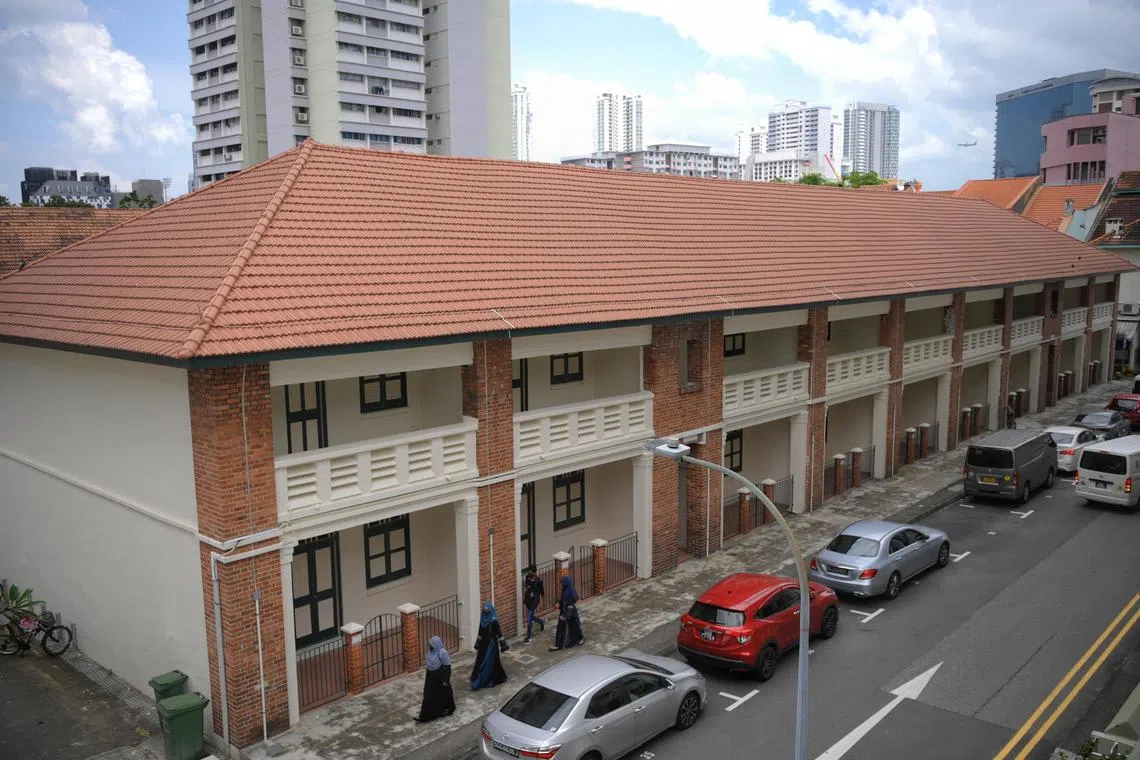More state properties to be used as co-living spaces as SLA awards Little India tender
Sign up now: Get ST's newsletters delivered to your inbox

The tender for 79 to 95 Hindoo Road in Little India has been awarded to construction and development company Eco Energy.
PHOTO: ST FILE
Follow topic:
SINGAPORE - More state properties are expected to be put aside for co-living use in the next few months, as the Singapore Land Authority (SLA) on Wednesday awarded a tender for this purpose in Hindoo Road.
The two-storey building at 79 to 95 Hindoo Road in Little India has been awarded to construction and development company Eco Energy, which is collaborating with Cove Living, a co-living operator.
The building, which comprises 18 apartment units with a gross floor area of about 1,700 sq m, is the first shophouse-type asset class under the state property portfolio
With societal trends veering towards co-living, the move is a response to the market’s evolving demand. There were 16 bids for this tender, SLA said in a statement on Wednesday.
Emphasising the need for innovative spaces, SLA chief executive Colin Low said the authority has been actively engaging players to explore creative interim uses for properties as lifestyle and consumer trends evolve. By understanding market demand and needs, and through open-price and quality tenders, SLA can partner with operators to enhance its properties for the benefit of Singapore and the community.
The revamped space will be named 1925 Quarters, in recognition of the property’s historical role of housing junior Asian staff of the Municipality of Singapore.
Eco Energy’s winning proposal, jointly developed with Cove Living, offers communal areas designed to foster tenant interaction and bonding, while technology will be tapped to organise community events like urban farming workshops and heritage walks, to promote neighbourliness among the residents.
In line with SLA’s sustainability goals, the redevelopment will incorporate energy-saving appliances, eco-friendly sanitary fittings in the bathrooms, and food composters, among other features.
In redeveloping the shophouses while preserving the heritage and essence of the historical building, a key challenge facing Eco Energy is the integration of 36 extra toilets, on top of the existing 18.
Eco Energy general manager David Tan told The Straits Times that as the row of double-storey shophouses was built in 1925, the present toilet facilities do not align with modern standards and expectations of tenants today.
There are two rooms in each of the 18 units. The challenge is to fit three co-living bedrooms into every unit, each with an en-suite bathroom, he said.
While co-living is gaining ground and occupants generally do not mind sharing meals in a common dining area or watching movies together in the living room, it would be challenging to get occupants in a unit to share one bathroom, he added.
The co-living space will cater to professionals and foreign students, and the monthly rent will start from $3,500. The project is expected to be ready in early 2024, said Mr Tan.
Following the award of the tender for the Hindoo Road property, SLA launched a new tender for another co-living concept at a state property at 26 Evans Road. The site, located on the fringe of the city centre and a stone’s throw from the Singapore Botanic Gardens and Botanic Gardens MRT station, is ideally positioned for co-living spaces, SLA said.
Proposals for this site will undergo a similar evaluation process as for the Hindoo Road site, emphasising price and quality and how the redeveloped property can contribute to the continued rejuvenation and vibrancy of the precinct.
It will also consider green initiatives and efforts by the tenderers’ business operations. This tender will offer an extended upfront tenure of five years, renewable for another four years.
Sites for tender in the coming months include 15 to 31 Hindoo Road. Details of future projects will be unveiled in due course.
Mr Low said: “This is an effort we have been seeding since 2022. The successful introduction of these co-living tenders across more classes of state properties signals our commitment to unlock the value of state properties and leverage adaptive interim reuse of these properties to address the evolving needs of Singapore.”


